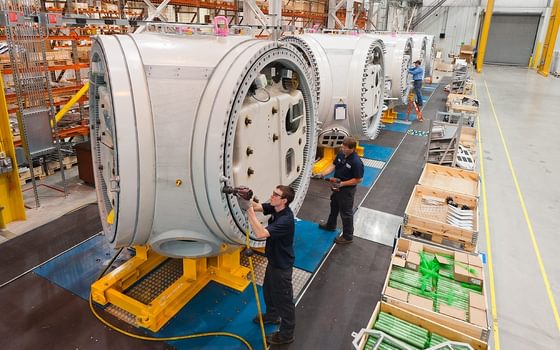Theresa May’s industrial vision cannot work
Britain’s industrial strategy is incompatible with a hard Brexit.
24 January 2017
Yesterday the government outlined its approach to Britain’s long-overdue industrial strategy.
The paper’s “ten pillars” – including pledges for stronger domestic supply chains, more infrastructure investment and clean growth – are a step in the right direction. We argued in favour of many of them in our evidence submission last year.
But will the strategy actually be implemented? Much of what was outlined yesterday is entirely incompatible with the PM’s “hard Brexit” vision.
If the UK leaves the single market, British businesses will be locked out of vital markets across the continent. Other Free Trade Agreements cannot make up for lost demand from our closest neighbours.
It’s also impossible to reconcile the government’s low-tax low-regulation standards aspirations for post-Brexit Britain with the kind of active state needed to materially support UK industries and regions.
A proper industrial strategy doesn’t need more market deregulation, but more public intervention. The decades of flatlining regional productivity and widening inequality laid bare in yesterday’s green paper is all the evidence we need that deregulated labour and product markets cannot be relied on to build a more efficient, sustainable or fair economy.
The British economy needs an urgent refit
Pledges for more “patient capital” and more support for business investment and R&D are all well and good – but we can’t achieve this with Britain’s current financial system.
The assumption of the green paper is that we can deliver an industrial strategy simply by providing small amounts of ad-hoc finance. If we have learnt anything from other countries’ experiences a major overhaul is needed instead.
For decades big UK banks have favoured speculative lending over lending to UK businesses – particularly SMEs. At the same time the financialisation of UK businesses has led to short-termism, prioritising shareholder returns and share buy-backs over long-term investment in physical capital or workers’ skills.
To reboot our economic system and meet the objectives set out by the government’s green paper we need to curb the power of short-term shareholding to the benefit of long term investment; to create parallel financial instruments, such as a strong network of local banks, which can provide much-needed finance to SMEs across the UK; and to enhance the firepower of the British Business Bank and the reinstate a public Green Investment Bank.
Anything short of this will fail those regions, people and businesses most in need of a new industrial strategy.
We need to invest in people and places
The green paper correctly emphasises regional inequalities in terms of productivity, innovation and specialisation in cutting-edge activities. But focusing on high-technology sectors alone is unlikely to deliver enough good jobs in all parts of the country, and the idea of mini-Silicon Valleys spawning across marginalised communities is clearly unrealistic.
Along innovative cutting-edge activities, local areas also need support for upgrading more traditional economic sectors in which they specialise, and for building their local supply chains.
But to deliver local development, communities need financial means and instruments. The additional funding announced in the Green paper (in line with earlier announcements) is clearly insufficient – particularly given the loss of EU structural funds that a hard Brexit would imply.
Topics Industrial strategy






